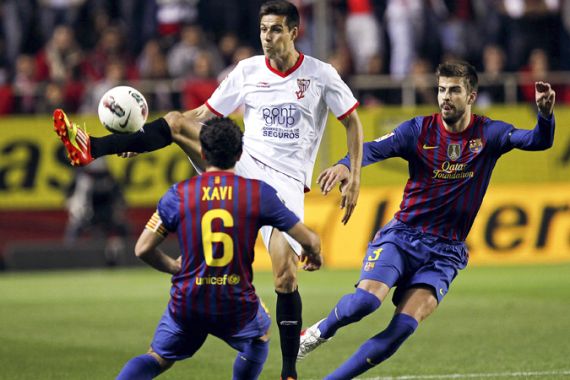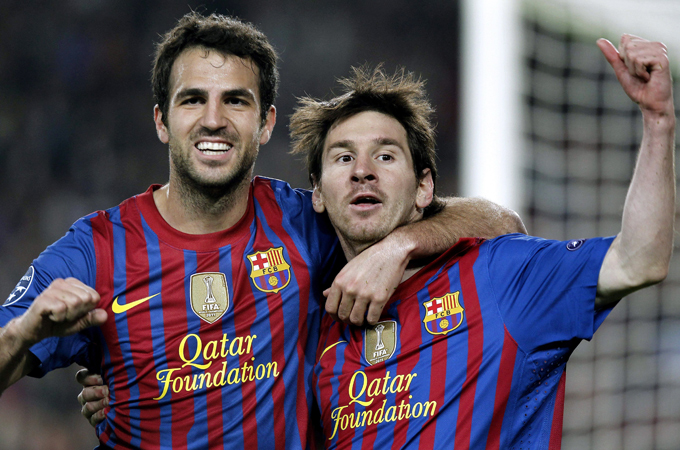Spanish league hit by debt crisis
Debt and unpaid taxes plague one of the most lucrative football leagues in the world, mirroring national woes.

 |
| Big stars and big money: Clubs in the top two Spanish divisions owe a combined $988 in debt [EPA] |
Although it boasts some of the world’s biggest stars in Lionel Messi and Cristiano Ronaldo, Spanish football’s debt crisis has put the league on course for economic ruin.
Both Barcelona and Madrid have reached the European Champions League semi-finals, and could meet in the final on May 19 in Munich. Primera Division rivals Atletico Madrid, Valencia and Athletic Bilbao are in the Europa League semi-finals.
Keep reading
list of 4 itemsSaudi reviews football fan rules after whip attack
Bayer Leverkusen win first Bundesliga title, ending Bayern Munich’s reign
Arsenal shocked by late Aston Villa double as title tilts towards Man City
But the reality of their finances – much like the rest of the struggling country’s economy – do not look as promising as their chances to win more European titles.
According to recent government assessments, clubs in the top two divisions owe $988 million in unpaid taxes – a spike of $195 million over the past four years.
The top division alone holds a combined debt of $4.61 billion through the 2010-11 season, with six of the teams in bankruptcy protection with payments due by June 30.
“Everything that is happening is based on the real economy,” University of Barcelona economics and finance professor Jose Maria Gay told The Associated Press.
“Spanish football is authentically marvellous right now, you have to tip your hat to it.
“But the trees are shielding us from the very real state of the forest. Many clubs are living dangerously.”
National problems
Spanish football’s economic worries mirror the state’s problems, with the country’s flagging economy heading into another recession and in danger of following Greece, Portugal and Ireland in need of a bailout.
Real Madrid, who lead the Spanish league by four points, have debts of $773 million, while Barcelona’s stand at $756 million and Atletico’s are $675 million. Valencia have sold star players like David Villa, David Silva and Juan Mata to drop their own debt to $500 million.
Those numbers eclipse the record revenue of $630 million taken in by Madrid – the world’s richest club – in 2010-11 or the $590 million accumulated by Barcelona.
Spanish sports secretary Miguel Cardenal said clubs would get no special treatment when it came to paying the back taxes, but acknowledged it was “impossible” to expect full payment by June.
So far, the sports ministry plans to have a solution “within a reasonable period of time.”
“Considering the context of the situation our country is facing, it’s unreasonable to start introducing dysfunctional steps into the championship that could affect its image, which has a commercial value,” Cardenal said in an email to The Associated Press.
The government cannot demand payment without crippling clubs and leaving supporters very upset, according to Gay. And no government wants to take such blame at a time when Spanish football has provided a healthy distraction to the tough austerity measures being introduced by a new government enduring record unemployment figures of 23 percent.
“Football on the weekends and three days during the week helps to conceals reality of the problem,” said Gay, who served on the board of Barcelona-based football club Espanyol for nearly two seasons.
“In the end, everyone is concentrated on Madrid and Barca, who are the kings of the banquet while the rest live a real uncertain future.”
Tough measures
League spokesman Juan Carlos Santamaria said discussions with the sports ministry were constructive and agreements were being made on how to resolve the debt situation, but did not provide details on the accords except to say “clearly changes need to be made.” Santamaria said a commission created to monitor club’s spending and accounts will help.
“Clubs will control their accounts and their costs so the debts don’t rise because they know that tough measures await,” said Santamaria, mentioning fines, point deductions and relegation as the potential penalties.
But none of those will come into effect for another three years, when UEFA’s financial fair play system takes effect.
Under the UEFA plan, clubs must break even on football-related income and spending, and will be permitted losses of $6.6 million in the first two years, or up to $60 million if a wealthy owner makes a one-off payment to clear debts. Madrid and Barcelona will not be afforded such a luxury because the teams are owned by their club members.
If this principle of “live within your means” is not followed, clubs can be excluded from the Champions League and Europa League.
Gay, who believes Valencia, Athletic Bilbao and Osasuna are the only clubs outside the top two who are certain to survive, laughed when asked if Spanish clubs were en route to meeting this criteria.
|
“A rescue plan needs to be put into place for football. You have to help them and supervise them and levy rigorous controls. That’s not being done right now “ – Jose Maria Gay |
“A rescue plan needs to be put into place for football. You have to help them and supervise them, and levy rigorous controls. That’s not being done right now,” Gay said.
While rigorous checks still need to be implemented, nearly all discussions involving the Spanish league’s problems point toward one theme: TV money.
That continues to divide the top two clubs and the rest with Valencia presenting the best example. Valencia’s TV revenues of $55 million are less than the $59 million earned by English Premier League club Wigan, who have been battling relegation since they rose to the top division in 2005.
Spain touts itself as the world’s best league on the back of Messi and Ronaldo, Barcelona and Madrid, but its TV licensing does not reflect that as it pulls in just half of the $1.66 billion of the Premier League, and two-thirds of what Italy’s Serie A makes at $1.198 billion.
“We have to adapt to the new reality, that the crisis is affecting everybody in life, including now in football,” Mallorca President Jaume Cladera said.